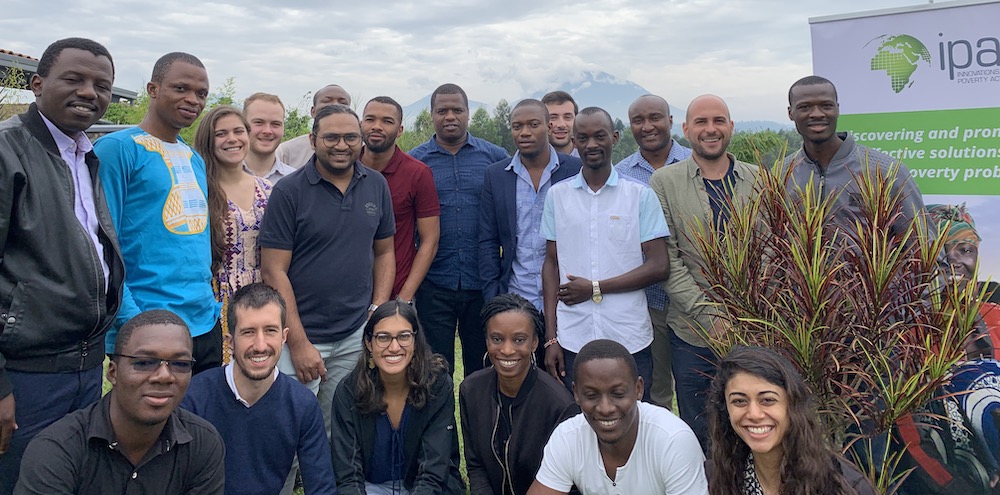Four Things that are Top of Mind for IPA

A photo of IPA staff taken during IPA's Africa Regional Research & Data Summit, held in March 2020 in Ruhengeri, Rwanda before global lockdowns started due to the COVID-19 pandemic.
Even in these difficult times, we are reflecting on our key accomplishments and lessons and, most importantly, staying focused on the major tasks to come. Looking into 2022, as we approach IPA's 20th anniversary, four things are top of mind for us as we look to create an even greater impact in the coming year and years.
1. Improving lives through evidence
Our strong and long-lasting partnerships with governments and civil societies across Asia, Latin America, and Africa remain at the core of our ability to improve people’s lives. Concretely, this means that teachers are being trained in evidence-based primary and early childhood strategies in Ghana. More couples are being reached with a promising intimate partner violence prevention program in Uganda. And in the height of the pandemic in South Asia, we were able to work with a lead research team and a coalition of committed partners to scale up the evidence-based NORM model to over 100 million people. At the same time, we have seen an increased appetite among our partners to invest in their own cultures of evidence and data use. We expanded our embedded labs portfolio and are delighted to have six new lab partnerships under development which we will announce later this year.
2. Continuing to serve as an R&D engine to discover and advance cost-effective solutions that do the most good possible per dollar
IPA at its heart is a discovery engine, and we’re proud to have worked alongside our network of researchers to advance many of the discoveries that are considered among the “best buys” in fighting poverty such as deworming, free malaria bednets, and unconditional cash transfers. But there’s a lot more to learn. As our knowledge and research methods have expanded, we can tackle equally compelling, but even more challenging problems. A decade ago there were very few randomized trials on interventions to address peace, violence, and crisis recovery, but we have helped to build a body of evidence around it. In the coming years, we want to double down on the interventions that are emerging as promising, honing in on the research questions that will foster the opportunity to scale, such as cost-benefit or delivery adaptations.
As we move ahead, we are eager to bring more urgency and intentionality to a process of discovery and scaling that has, for the most part, been organic. We see this as a call for not only the evidence generation sector, but also the effective altruism community which so heavily relies on the evidence IPA and peer organizations generate, and implementers that are so critical to the scaling process. With greater investment, strategy, and focus around evidence generation, we envision more rapid learning and iteration to foster large-scale impact.
3. Doubling down on our efforts to make our research and partner network more representative of the communities where we work
At the heart of our work remains our commitment to being locally grounded and bringing together a variety of perspectives through our global network. We worked to increase the representation of researchers from the countries where we work. We signed agreements with 15 universities and research institutions across East and West Africa as a foundational step to fostering deeper partnerships with researchers from the global south, including internship opportunities and joint funding proposals for new research projects. With 85% of IPA’s research staff being hired from the countries we work, going forward we will concentrate our efforts on two areas that we think play to IPA’s strengths:
- Building the pipeline of researchers: We will increase the number of internship opportunities in our Africa Research Internship program, create a pooled scholarship fund, and provide increased mentorship in collaboration with IPA’s internal researcher network to high-performing staff and early career researchers.
- Making research happen: We will continue to raise sector funds to support network development and small grant offerings for southern researchers and look for joint funding opportunities with partners to expand opportunities for researchers from low- and middle-income countries. We will also increase the availability of research design and proposal preparation support for researchers and create more opportunities to support local researchers who are under considerable bandwidth constraints.
4. Fostering meaningful connection and igniting passion amidst a prolonged pandemic
We have seen how the pandemic and prolonged remote work have put a strain on workers around the world, and our staff and research network are no exception. Recognizing and valuing our people and networks as our greatest asset, we are committed to investing in opportunities to enable greater connection between staff from all IPA country offices and our work across the globe. We are also keen to look at how we can support researchers to stay connected with field research while they struggle with the multiple constraints of adjusting their teaching methods, managing children at home, and trying to continue to build professional academic careers. We are excited to re-engage with our staff and partners to look at how we can better deploy new ways of working to continue fulfilling our mission. And as we embark on IPA@20 years, we will also be celebrating our accomplishments and hard work, and looking to the future. We hope you will join us.












